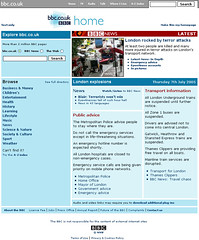How the BBC dealt with Internet traffic on July 7th, 2005
Yesterday's terrorist attacks on London caused a massive spike in internet traffic to news sites in the UK, which was covered in a couple of articles published today:
- BBC News - News sites toil as visits rocket
- Net Imperative - UK news sites swamped after London blasts
According to Sky News they had 1.7 million unique users during the day - "That's the equivalent of a month's traffic on the site". We haven't crunched the numbers on our logfiles yet, but I'm sure we'll make them available as soon as we have them. We do have some numbers on the page requests, throughput and concurrent streams the BBC was running yesterday, and frankly, they make my head hurt.
Today the BBC published a page looking at some of the statistics. It was the idea of a guy I work with who did all the effort in getting the graphs and getting in touch with the right people to get the right figures. It has been linked to from the Points Of View message board, but I'm not sure yet where else we have publicised it.
The big numbers are that the peak bandwidth was over 11.1Gb/s (not including the 3Gb/sec that was distributed via Akami for our news service. News were dealing with 40,000 requests per second. At the peak of demand the BBC was serving over 120,000 concurrent streams.
So for a start I have to rip-up every calculation I have about what we are capable of serving, and what we are expecting to serve. Wednesday's Olympics announcement sparked a peak of 5 Gb/s, the Jackson verdict 7.2 Gb/s. Suddenly those figures have become *only* 7.2Gb/s.
The way that the BBC responds to events like this, and is able to respond to events like this, is one of the reasons I get annoyed when I see people bandying about claims that the BBC has "caused serious damage to the competitive market in new media areas". I'm well aware that we have a new media budget most companies can only dream of, but I'm also well aware that it is spread across a lot of services, many of which are demonstrably not provided by the market.
I didn't see any of the other major broadcasters or news outlets in the UK yesterday doing what we did online.
We reduced our homepage to the minimum amount of content in order to serve as many people as possible with the public service information they needed. If you went to www.bbc.co.uk yesterday afternoon you didn't get adverts for the evenings programming, or an invitation to explore the depth and breadth of a broadcaster's web offering, or a competition to see who could get the confirmed death and injury toll the highest, fastest. Instead we provided public service information that up front delivered the latest news, the emergency number, the advice given out by the police and links to the major external agencies involved in managing the events.
Anyway, enough of my soapbox, in a pretty subdued atmosphere today one thing made me laugh out loud in the office. Having established that both myself and my wife were safe, one of my friends from outside the BBC who had obviously experienced the dreaded 'operation timed out' message sent me a text saying:
Tell the BBC to spend some of my licence fee on a bit more bandwidth
:-)

at least the net coped. i live a mile from Kings Cross, and the mobile phone networks were useless until 4pm
Hey. Well done, one and all. I was out of the country, and I never experienced a failure from the BBC site.
I read somewhere the phone networks were in emergency mode, with reduced capacity to normal users to allow for critical usage to continue.